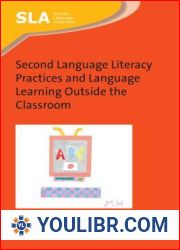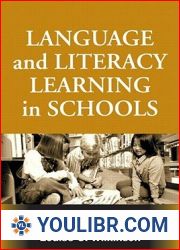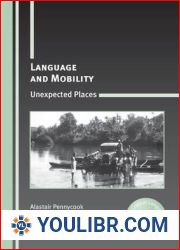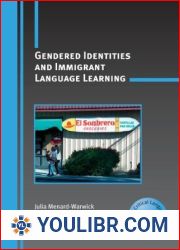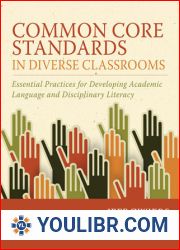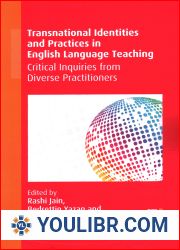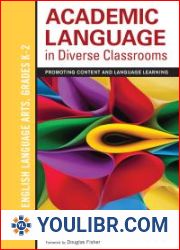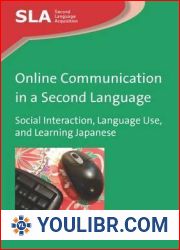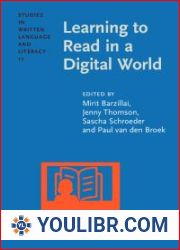
BOOKS - Second Language Literacy Practices and Language Learning Outside the Classroo...

Second Language Literacy Practices and Language Learning Outside the Classroom (Second Language Acquisition, 127) (Volume 127)
Author: Miho Inaba
Year: November 21, 2018
Format: PDF
File size: PDF 856 KB
Language: English
Year: November 21, 2018
Format: PDF
File size: PDF 856 KB
Language: English
This book presents a comprehensive and detailed study of literacy practices and language use outside of the classroom by university students of Japanese. It investigates both tasks related to classes (e.g. homework and preparation for classes) and voluntary activities in the target language (e.g. watching TV and writing emails) and discusses how values, motivations and types of activities differ between the two contexts. It employs sociocultural perspectives to observe reading and writing activities within and under the influence of individual and social contexts, such as learner motives, peer networks and the language classroom, and contributes to the related research areas in the field of second language acquisition, such as motivation, autonomous language learning and language learning strategies. Crucially, the book not only documents out-of-class literacy activities, but also examines which teaching practices facilitate and promote such out-of-class language learning and use. It considers which literacy activities in the target language students undertake out-of-class, which factors encourage or discourage such out-of-class activity and how and with which tools they undertake these activities. As such the book provides guidance for classroom teaching and suggests that slight changes to teaching practices in the classroom may enhance autonomous learning outside the classroom.
第二語言掃盲實踐和學習課外語言習得第二語言127卷127在本書中,我們將深入研究技術演變的復雜過程及其對人類在交戰世界中的生存和團結的影響。文本分為幾個部分,以確保對主題的全面理解。*研究技術演變過程及其對人類生存和團結的影響的重要性。*需要一個個人範式,將現代知識的發展過程視為人類生存和團結的基礎。第一章:技術的演變*技術的迅速發展及其對社會的影響。*技術在塑造現代世界方面的作用及其對人類未來的影響。第二章:發展個人範式的重要性*個人需要發展個人範式,以了解現代知識發展的技術過程。*存在個人範式對現代知識發展的技術過程感知的好處。第三章:技術對人類的影響*技術對人類關系和交流的影響。*技術統一或分裂人類的潛力。第四章:語言在技術發展中的作用*語言在現代知識發展和傳播中的重要性。*語言對人類生存和團結的影響。
교실 2 차 언어 습득 외부의 2 차 언어 교육 실습 및 언어 학습 127 권이 책에서 우리는 복잡한 기술 진화 과정과 전쟁 세계에서 인류의 생존과 통일성에 미치는 영향을 탐구합니다. 텍스트는 주제에 대한 포괄적 인 이해를 제공하기 위해 섹션으로 나뉩니다. 소개 * 기술의 진화 과정과 인류의 생존과 통일성에 미치는 영향을 연구하는 것의 중요성. * 인간 생존과 통일의 기초로서 현대 지식 개발의 기술 과정에 대한 인식의 개인적인 패러다임의 필요성. 1 장: 기술의 진화 * 기술 발전의 빠른 속도와 사회에 미치는 영향. * 현대 세계를 형성하는 기술의 역할과 인류의 미래에 미치는 영향. 2 장: 개인 패러다임 개발의 중요성 * 개인이 현대 지식 개발의 기술 프로세스를 이해하기위한 개인 패러다임을 개발해야합니다. * 현대 지식 개발의 기술 프로세스 인식을위한 개인 패러다임의 장점. 3 장: 인류에 대한 기술의 영향 * 인간 관계 및 커뮤니케이션에 대한 기술의 영향. * 인류를 통합하거나 분열시키는 기술의 잠재력. 4 장: 기술 개발에서 언어의 역할 * 현대 지식의 발전과 보급에있어 언어의 중요성. * 언어가 인류의 생존과 통일성에 미치는 영향. Práctica de la alfabetización de la segunda lengua y aprendizaje de la lengua fuera de clase Adquisición de la segunda lengua 127 Volumen 127 En este libro profundizamos en el complejo proceso de evolución de la tecnología y su impacto en la supervivencia y unidad de la humanidad en un mundo en guerra. texto se divide en secciones para permitir una comprensión integral del tema. Introducción * Importancia del estudio del proceso de evolución de la tecnología y su impacto en la supervivencia y la unidad de la humanidad. * Necesidad del paradigma personal de percibir el proceso tecnológico del desarrollo del conocimiento moderno como base de la supervivencia y la unidad humana. Capítulo 1: Evolución de la tecnología * ritmo rápido de los avances tecnológicos y su impacto en la sociedad. * papel de la tecnología en la formación del mundo moderno y sus implicaciones para el futuro de la humanidad. Capítulo 2: La importancia del desarrollo del paradigma personal * La necesidad de que los individuos desarrollen un paradigma personal para comprender el proceso tecnológico del desarrollo del conocimiento moderno. * ventajas de tener un paradigma personal para percibir el proceso tecnológico del desarrollo del conocimiento moderno. Capítulo 3: Impacto de la tecnología en la humanidad * Impacto de la tecnología en las relaciones humanas y la comunicación. * Potencial de la tecnología para unir o dividir a la humanidad. Capítulo 4: papel del lenguaje en el desarrollo tecnológico * La importancia del lenguaje en el desarrollo y la difusión del conocimiento moderno. * La influencia del lenguaje en la supervivencia y la unidad de la humanidad. Alphabetisierungspraxis der zweiten Sprache und Erlernen der Sprache außerhalb des Unterrichts Erwerb der zweiten Sprache 127 Band 127 In diesem Buch vertiefen wir uns in den komplexen Prozess der technologischen Evolution und seine Auswirkungen auf das Überleben und die Einheit der Menschheit in einer kriegführenden Welt. Der Text ist in Abschnitte unterteilt, um ein umfassendes Verständnis des Themas zu ermöglichen. Einleitung * Die Bedeutung der Untersuchung des Prozesses der Evolution der Technologie und ihre Auswirkungen auf das Überleben und die Einheit der Menschheit. * Die Notwendigkeit eines persönlichen Paradigmas der Wahrnehmung des technologischen Prozesses der Entwicklung des modernen Wissens als Grundlage für das Überleben und die Einheit des Menschen. Kapitel 1: Die Entwicklung der Technologie * Das schnelle Tempo des technologischen Fortschritts und seine Auswirkungen auf die Gesellschaft. * Die Rolle der Technologie bei der Gestaltung der modernen Welt und ihre Auswirkungen auf die Zukunft der Menschheit. Kapitel 2: Die Bedeutung der Entwicklung des persönlichen Paradigmas * Die Notwendigkeit für Einzelpersonen, ein persönliches Paradigma für das Verständnis des technologischen Prozesses der Entwicklung des modernen Wissens zu entwickeln. * Die Vorteile eines persönlichen Paradigmas für die Wahrnehmung des technologischen Prozesses der Entwicklung des modernen Wissens. Kapitel 3: Die Auswirkungen der Technologie auf die Menschheit * Die Auswirkungen der Technologie auf die menschlichen Beziehungen und Kommunikation. * Das Potenzial der Technologie, die Menschheit zu vereinen oder zu spalten. Kapitel 4: Die Rolle der Sprache in der technologischen Entwicklung * Die Bedeutung der Sprache bei der Entwicklung und Verbreitung des modernen Wissens. * Der Einfluss der Sprache auf das Überleben und die Einheit der Menschheit. Second Language Literacy Practice and Language arning Outside the Classroom Second Language Acquisition 127 Volume 127この本では、テクノロジーの進化の複雑なプロセスと、戦争の世界における人類の生存と団結への影響を掘り下ろう。テキストは、主題の包括的な理解を提供するために、セクションに分かれています。はじめに*技術の進化のプロセスと人類の生存と団結への影響を研究することの重要性。*人間の生存と団結の基礎としての近代的な知識の開発の技術的プロセスの認識の個人的パラダイムの必要性。第1章:技術の進化※技術の急速な進歩と社会への影響*現代世界を形作る技術の役割と人類の未来への影響。第2章:個人的なパラダイム開発の重要性*現代の知識開発の技術的プロセスを理解するための個人的なパラダイムを開発する必要性。第3章:技術が人類に及ぼす影響※技術が人間関係やコミュニケーションに及ぼす影響。*技術が人類を一つにしたり分裂させたりする可能性。第4章:技術開発における言語の役割*現代の知識の発展と普及における言語の重要性。 La pratique de l'alphabétisation de la langue seconde et l'apprentissage de la langue en dehors de la classe Acquisition de la langue seconde 127 Volume 127 Dans ce livre, nous approfondissons le processus complexe de l'évolution de la technologie et de son impact sur la survie et l'unité de l'humanité dans un monde en guerre. texte est divisé en sections pour permettre une compréhension complète du sujet. Introduction * Importance de l'étude du processus d'évolution de la technologie et de son impact sur la survie et l'unité de l'humanité. * Nécessité d'un paradigme personnel de la perception du processus technologique du développement des connaissances modernes comme base de la survie et de l'unité de l'homme. Chapitre 1 : L'évolution de la technologie * rythme rapide des progrès technologiques et leur impact sur la société. * rôle de la technologie dans la formation du monde moderne et ses conséquences pour l'avenir de l'humanité. Chapitre 2 : Importance du développement du paradigme personnel * Nécessité pour les individus de développer un paradigme personnel pour comprendre le processus technologique du développement des connaissances modernes. * Avantages d'avoir un paradigme personnel pour percevoir le processus technologique du développement des connaissances modernes. Chapitre 3 : Impact de la technologie sur l'humanité * Impact de la technologie sur les relations et la communication humaines. * Potentiel de la technologie pour unir ou diviser l'humanité. Chapitre 4 : rôle de la langue dans le développement technologique * L'importance de la langue dans le développement et la diffusion des connaissances modernes. * L'impact de la langue sur la survie et l'unité de l'humanité. Second Language Literacy Practice and Language arning Outside the Classroom Second Language Acquisition 127 Cilt 127 Bu kitapta, teknoloji evriminin karmaşık sürecini ve bunun savaşan bir dünyada insanlığın hayatta kalması ve birliği üzerindeki etkisini inceliyoruz. Metin, konunun kapsamlı bir şekilde anlaşılmasını sağlamak için bölümlere ayrılmıştır. Giriş * Teknolojinin evrim sürecini ve bunun insanlığın hayatta kalması ve birliği üzerindeki etkisini incelemenin önemi. * İnsanın hayatta kalması ve birliği için temel olarak modern bilginin gelişiminin teknolojik sürecinin algılanmasına dair kişisel bir paradigma ihtiyacı. Bölüm 1: Teknolojinin evrimi * Teknolojik gelişmelerin hızlı temposu ve toplum üzerindeki etkileri. * Teknolojinin modern dünyayı şekillendirmedeki rolü ve insanlığın geleceği üzerindeki etkileri. Bölüm 2: Kişisel paradigma gelişiminin önemi * Bireylerin modern bilgi gelişiminin teknolojik sürecini anlamak için kişisel paradigma geliştirmeleri gerekliliği. * Modern bilgi gelişiminin teknolojik sürecinin algılanması için kişisel paradigmaya sahip olmanın avantajları. Bölüm 3: Teknolojinin insanlık üzerindeki etkisi * Teknolojinin insan ilişkileri ve iletişim üzerindeki etkisi. * Teknolojinin insanlığı birleştirme veya bölme potansiyeli. Bölüm 4: Dilin teknolojik gelişimdeki rolü * Dilin modern bilginin gelişimi ve yayılmasındaki önemi. * Dilin insanlığın hayatta kalması ve birliği üzerindeki etkisi. Практика грамотности второго языка и изучение языка вне класса Приобретение второго языка 127 Том 127 В этой книге мы углубляемся в сложный процесс эволюции технологий и его влияние на выживание и единство человечества в воюющем мире. Текст разделен на разделы, чтобы обеспечить всестороннее понимание предмета. Введение * Значение изучения процесса эволюции технологий и его влияния на выживание и единство человечества. * Необходимость личной парадигмы восприятия технологического процесса развития современных знаний как основы выживания и единства человека. Глава 1: Эволюция технологий * Быстрые темпы технологических достижений и их влияние на общество. * Роль технологий в формировании современного мира и ее последствия для будущего человечества. Глава 2: Важность развития личностной парадигмы * Необходимость для отдельных лиц развивать личностную парадигму для понимания технологического процесса развития современных знаний. * Преимущества наличия личностной парадигмы для восприятия технологического процесса развития современных знаний. Глава 3: Влияние технологий на человечество * Влияние технологий на человеческие отношения и коммуникацию. * Потенциал технологий для объединения или разделения человечества. Глава 4: Роль языка в технологическом развитии * Важность языка в развитии и распространении современных знаний. * Влияние языка на выживание и единство человечества. Prática de alfabetização de segunda língua e aprendizagem de língua fora da classe Aquisição de segunda língua 127 Volume 127 Neste livro, nós nos aprofundamos no complexo processo de evolução da tecnologia e seu impacto na sobrevivência e unidade da humanidade no mundo em guerra. O texto está dividido em seções para garantir uma compreensão completa da matéria. Introdução * O significado de estudar o processo de evolução da tecnologia e seus efeitos na sobrevivência e unidade humana. Capítulo 1: Evolução da tecnologia * O ritmo rápido dos avanços tecnológicos e seus efeitos na sociedade. Capítulo 2: A importância do desenvolvimento do paradigma pessoal * A necessidade de indivíduos desenvolverem um paradigma de personalidade para compreender o processo tecnológico de desenvolvimento do conhecimento moderno. Capítulo 3: O impacto da tecnologia na humanidade * O impacto da tecnologia nas relações humanas e na comunicação. Capítulo 4: O papel da linguagem no desenvolvimento tecnológico * A importância da linguagem no desenvolvimento e difusão dos conhecimentos modernos. Second Language Literacy Practices and Language Learning Outside the Classroom Second Language Acquisition 127 Volume 127 In this book, we delve into the intricate process of technology evolution and its impact on humanity's survival and unity in a warring world. The text is divided into sections to provide a comprehensive understanding of the subject matter. Introduction * The significance of studying the process of technology evolution and its impact on humanity's survival and unity. * The need for a personal paradigm for perceiving the technological process of developing modern knowledge as the basis for human survival and unity. Chapter 1: The Evolution of Technology * The rapid pace of technological advancements and their influence on society. * The role of technology in shaping the modern world and its implications for humanity's future. Chapter 2: The Importance of Developing a Personal Paradigm * The need for individuals to develop a personal paradigm for understanding the technological process of developing modern knowledge. * The benefits of having a personal paradigm for perceiving the technological process of developing modern knowledge. Chapter 3: The Impact of Technology on Humanity * The effects of technology on human relationships and communication. * The potential for technology to unite or divide humanity. Chapter 4: The Role of Language in Technological Advancement * The importance of language in the development and dissemination of modern knowledge. * The impact of language on the survival and unity of humanity. ممارسة محو الأمية اللغوية الثانية وتعلم اللغة خارج الفصل الدراسي الحصول على اللغة الثانية 127 المجلد 127 في هذا الكتاب، نتعمق في العملية المعقدة لتطور التكنولوجيا وتأثيرها على بقاء ووحدة البشرية في عالم متحارب. وينقسم النص إلى فروع لتوفير فهم شامل للموضوع. * أهمية دراسة عملية تطور التكنولوجيا وأثرها على بقاء البشرية ووحدتها *. الفصل 1: تطور التكنولوجيا * الوتيرة السريعة للتقدم التكنولوجي وأثره على المجتمع *. الفصل 2: أهمية تطوير النموذج الشخصي * ضرورة قيام الأفراد بوضع نموذج شخصي لفهم العملية التكنولوجية لتطوير المعرفة الحديثة *. الفصل 3: أثر التكنولوجيا على البشرية * تأثير التكنولوجيا على العلاقات الإنسانية والاتصالات *. الفصل ٤: دور اللغة في التطور التكنولوجي * أهمية اللغة في تطوير ونشر المعارف الحديثة *. Second Language Literacy Practice and Language arning Outside the Classroom Second Language Acquisition 127 Tom 127 W tej książce zagłębiamy się w złożony proces ewolucji technologii i jej wpływ na przetrwanie i jedność ludzkości w wojującym świecie. Tekst podzielony jest na sekcje, aby zapewnić kompleksowe zrozumienie tematu. Wprowadzenie * Znaczenie badania procesu ewolucji technologii i jej wpływu na przetrwanie i jedność ludzkości. * Potrzeba osobistego paradygmatu postrzegania technologicznego procesu rozwoju nowoczesnej wiedzy jako podstawy ludzkiego przetrwania i jedności. Rozdział 1: Ewolucja technologii * Szybkie tempo postępu technologicznego i ich wpływ na społeczeństwo * Rola technologii w kształtowaniu współczesnego świata i jego konsekwencje dla przyszłości ludzkości. Rozdział 2: Znaczenie rozwoju paradygmatu osobistego * Konieczność rozwoju osobistego paradygmatu dla zrozumienia technologicznego procesu rozwoju nowoczesnej wiedzy. * Zalety posiadania osobistego paradygmatu postrzegania procesu technologicznego rozwoju nowoczesnej wiedzy. Rozdział 3: Wpływ technologii na ludzkość * Wpływ technologii na stosunki międzyludzkie i komunikację. * Potencjał technologii w celu zjednoczenia lub podziału ludzkości. Rozdział 4: Rola języka w rozwoju technologicznym * Znaczenie języka w rozwoju i upowszechnianiu nowoczesnej wiedzy. * Wpływ języka na przetrwanie i jedność ludzkości. Imparare la seconda lingua e imparare la lingua fuori dalla classe Acquisire la seconda lingua 127 Volume 127 In questo libro stiamo approfondendo il complesso processo di evoluzione della tecnologia e il suo impatto sulla sopravvivenza e l'unità dell'umanità nel mondo in guerra. Il testo è suddiviso in sezioni per garantire una piena comprensione dell'oggetto. Introduzione * Il significato di studiare l'evoluzione della tecnologia e il suo impatto sulla sopravvivenza e l'unità dell'umanità. Capitolo 1: Evoluzione della tecnologia * Rapidità dei progressi tecnologici e del loro impatto sulla società. Capitolo 2: L'importanza dello sviluppo del paradigma personale * La necessità per gli individui di sviluppare un paradigma personale per comprendere il processo tecnologico di sviluppo della conoscenza moderna. Capitolo 3: L'impatto della tecnologia sull'umanità * L'impatto della tecnologia sulle relazioni umane e sulla comunicazione. Capitolo 4: Il ruolo della lingua nello sviluppo tecnologico * L'importanza della lingua nello sviluppo e nella diffusione delle conoscenze moderne. להוריד קובץ PDF تنزيل ملف pdf download pdf file PDFファイルをダウンロード pobierz plik pdf pdf dosyasını indir télécharger le fichier pdf 下载 pdf 文件 PDF-Datei herunterladen Scarica il file pdf descargar archivo pdf descarregar ficheiro pdf download pdf file скачать файл PDF pdf 파일 다운로드
Questo libro offre uno studio completo e dettagliato della pratica dell'alfabetizzazione e dell'uso della lingua al di fuori del pubblico da parte degli studenti universitari giapponesi. Esplora sia le attività relative alle lezioni (ad esempio, compiti e preparazione) che le attività volontarie nella lingua di destinazione (ad esempio, guardare la TV e scrivere e-mail), e discute come i valori, le motivazioni e i tipi di azione variano tra i due contesti. Utilizza prospettive socioculturali per osservare la lettura e la scrittura all'interno e sotto l'influenza di contesti individuali e sociali, come le motivazioni degli studenti, le reti dei coetanei e la classe linguistica, e contribuisce ai settori collegati della ricerca sull'apprendimento della seconda lingua, come la motivazione, l'apprendimento autonomo della lingua e le strategie di apprendimento della lingua. È importante notare che il libro non solo documenta le attività extrascolastiche di alfabetizzazione, ma anche le pratiche didattiche che facilitano e incoraggiano l'apprendimento e l'uso della lingua extrascolastica. Esso esamina le attività di alfabetizzazione che gli studenti svolgono al di fuori della classe, quali fattori incoraggiano o ostacolano tali attività al di fuori della classe e come e con quali strumenti svolgono queste attività. In questo modo, il libro contiene una guida all'apprendimento in classe e suggerisce che piccoli cambiamenti nella pratica dell'insegnamento in classe possono migliorare l'apprendimento autonomo al di fuori della classe.
В этой книге представлено всестороннее и подробное изучение практики грамотности и использования языка за пределами аудитории студентами университетов японского языка. В нем исследуются как задачи, связанные с занятиями (например, домашние задания и подготовка к занятиям), так и добровольные действия на целевом языке (например, просмотр телевизора и написание электронных писем), а также обсуждается, как ценности, мотивации и типы действий различаются между двумя контекстами. Он использует социокультурные перспективы для наблюдения за чтением и написанием в рамках и под влиянием индивидуальных и социальных контекстов, таких как мотивы учащихся, сети сверстников и языковой класс, и вносит вклад в связанные области исследований в области усвоения второго языка, такие как мотивация, автономное изучение языка и стратегии изучения языка. Важно отметить, что книга не только документирует внеклассные мероприятия по обучению грамоте, но также рассматривает, какие учебные практики облегчают и поощряют такое внеклассное изучение и использование языка. В нем рассматривается вопрос о том, какие мероприятия по обучению грамоте учащиеся на целевом языке проводят вне класса, какие факторы поощряют или препятствуют такой деятельности вне класса и как и с помощью каких инструментов они проводят эти мероприятия. Таким образом, книга содержит руководство по обучению в классе и предполагает, что небольшие изменения в практике преподавания в классе могут улучшить автономное обучение вне класса.
Este livro apresenta um estudo completo e detalhado das práticas de alfabetização e uso da língua fora do público por estudantes universitários japoneses. Ele explora as tarefas de atividades (por exemplo, tarefas domésticas e treinamento para atividades) e as atividades voluntárias no idioma alvo (como assistir TV e escrever e-mails), e discute como os valores, motivações e tipos de ação variam entre os dois contextos. Ele usa perspectivas socioculturais para observar a leitura e a escrita dentro e sob a influência de contextos individuais e sociais, tais como motivações dos alunos, redes de colegas e aulas linguísticas, e contribui para áreas relacionadas de pesquisa no aprendizado da segunda língua, tais como motivação, aprendizagem autônoma da língua e estratégias de aprendizado da língua. É importante notar que o livro não só documenta atividades extracurriculares de alfabetização, mas também considera quais práticas de ensino facilitam e encorajam o aprendizado e o uso extracurricular da língua. Ele aborda quais atividades de alfabetização os alunos realizam fora da sala de aula, quais fatores incentivam ou impedem essas atividades fora da sala de aula e como e com quais ferramentas eles realizam essas atividades. Assim, o livro contém um manual de treinamento em sala de aula e sugere que pequenas mudanças na prática de ensino em sala de aula podem melhorar a aprendizagem autônoma fora da sala de aula.
Ce livre présente une étude complète et détaillée de la pratique de l'alphabétisation et de l'utilisation de la langue en dehors du public par les étudiants des universités de langue japonaise. Il examine à la fois les tâches liées aux cours (par exemple, les devoirs et la préparation aux cours) et les activités volontaires dans la langue cible (par exemple, regarder la télévision et écrire des courriels), et examine comment les valeurs, les motivations et les types d'activités diffèrent entre les deux contextes. Il utilise des perspectives socioculturelles pour observer la lecture et l'écriture dans le cadre et sous l'influence de contextes individuels et sociaux, tels que les motivations des élèves, les réseaux de pairs et la classe de langue, et contribue à des domaines de recherche connexes dans le domaine de l'apprentissage de la langue seconde, tels que la motivation, l'apprentissage autonome de la langue et les stratégies d'apprentissage de la langue. Il est important de noter que le livre ne se contente pas de documenter les activités extrascolaires d'alphabétisation, mais examine également les pratiques d'apprentissage qui facilitent et encouragent l'apprentissage et l'utilisation de la langue extrascolaire. Il examine les activités d'alphabétisation menées par les élèves dans la langue cible en dehors de la classe, les facteurs qui encouragent ou entravent ces activités en dehors de la classe et comment et par quels outils ils mènent ces activités. Ainsi, le livre fournit un guide d'apprentissage en classe et suggère que de petits changements dans les pratiques d'enseignement en classe peuvent améliorer l'apprentissage autonome en dehors de la classe.
Este libro presenta un estudio completo y detallado de las prácticas de alfabetización y el uso del idioma fuera del auditorio por parte de los estudiantes universitarios del idioma japonés. Explora tanto las tareas relacionadas con las clases (por ejemplo, tareas y preparación para las clases) como las acciones voluntarias en el idioma de destino (por ejemplo, ver la televisión y escribir correos electrónicos), y discute cómo los valores, motivaciones y tipos de acción varían entre dos contextos. Utiliza perspectivas socioculturales para observar la lectura y la escritura dentro del marco y bajo la influencia de contextos individuales y sociales, como las motivaciones de los alumnos, las redes de pares y el aula de idiomas, y contribuye a áreas de investigación relacionadas en el campo de la asimilación de la segunda lengua, como la motivación, el aprendizaje autónomo de idiomas y las estrategias de aprendizaje de idiomas. Es importante señalar que el libro no sólo documenta las actividades extraescolares de alfabetización, sino que también examina qué prácticas educativas facilitan y fomentan ese aprendizaje extraescolar y el uso del idioma. En él se examina qué actividades de alfabetización se realizan fuera del aula, qué factores fomentan o impiden esas actividades fuera del aula y cómo y con qué herramientas llevan a cabo esas actividades. Así, el libro contiene una guía de aprendizaje en el aula y sugiere que pequeños cambios en la práctica de la enseñanza en el aula pueden mejorar el aprendizaje autónomo fuera del aula.
This book presents a comprehensive and detailed study of literacy practices and language use outside of the classroom by university students of Japanese. It investigates both tasks related to classes (e.g. homework and preparation for classes) and voluntary activities in the target language (e.g. watching TV and writing emails) and discusses how values, motivations and types of activities differ between the two contexts. It employs sociocultural perspectives to observe reading and writing activities within and under the influence of individual and social contexts, such as learner motives, peer networks and the language classroom, and contributes to the related research areas in the field of second language acquisition, such as motivation, autonomous language learning and language learning strategies. Crucially, the book not only documents out-of-class literacy activities, but also examines which teaching practices facilitate and promote such out-of-class language learning and use. It considers which literacy activities in the target language students undertake out-of-class, which factors encourage or discourage such out-of-class activity and how and with which tools they undertake these activities. As such the book provides guidance for classroom teaching and suggests that slight changes to teaching practices in the classroom may enhance autonomous learning outside the classroom.
Dieses Buch bietet eine umfassende und detaillierte Untersuchung der Praxis der Alphabetisierung und des Sprachgebrauchs außerhalb des Publikums durch Studenten japanischer Sprachuniversitäten. Es untersucht sowohl Aufgaben im Zusammenhang mit Aktivitäten (z. B. Hausaufgaben und Unterrichtsvorbereitung) als auch freiwillige Aktivitäten in der Zielsprache (z. B. Fernsehen und E-Mails schreiben) und diskutiert, wie sich Werte, Motivationen und Arten von Aktivitäten zwischen den beiden Kontexten unterscheiden. Es nutzt soziokulturelle Perspektiven, um das Lesen und Schreiben innerhalb und unter dem Einfluss individueller und sozialer Kontexte wie Schülermotive, Peer-Networking und Sprachunterricht zu beobachten und trägt zu verwandten Forschungsbereichen im Bereich des Zweitspracherwerbs wie Motivation, autonomes Sprachenlernen und Sprachlernstrategien bei. Wichtig ist, dass das Buch nicht nur außerschulische Alphabetisierungsaktivitäten dokumentiert, sondern auch untersucht, welche Lernpraktiken ein solches außerschulisches Erlernen und Verwenden der Sprache erleichtern und fördern. Es geht um die Frage, welche Alphabetisierungsaktivitäten Schüler in der Zielsprache außerhalb des Klassenzimmers durchführen, welche Faktoren solche Aktivitäten außerhalb des Klassenzimmers fördern oder behindern und wie und mit welchen Instrumenten sie diese Aktivitäten durchführen. Das Buch enthält daher einen Leitfaden für das Lernen im Klassenzimmer und legt nahe, dass kleine Änderungen in der Unterrichtspraxis im Klassenzimmer das autonome Lernen außerhalb des Klassenzimmers verbessern können.
Questo libro offre uno studio completo e dettagliato della pratica dell'alfabetizzazione e dell'uso della lingua al di fuori del pubblico da parte degli studenti universitari giapponesi. Esplora sia le attività relative alle lezioni (ad esempio, compiti e preparazione) che le attività volontarie nella lingua di destinazione (ad esempio, guardare la TV e scrivere e-mail), e discute come i valori, le motivazioni e i tipi di azione variano tra i due contesti. Utilizza prospettive socioculturali per osservare la lettura e la scrittura all'interno e sotto l'influenza di contesti individuali e sociali, come le motivazioni degli studenti, le reti dei coetanei e la classe linguistica, e contribuisce ai settori collegati della ricerca sull'apprendimento della seconda lingua, come la motivazione, l'apprendimento autonomo della lingua e le strategie di apprendimento della lingua. È importante notare che il libro non solo documenta le attività extrascolastiche di alfabetizzazione, ma anche le pratiche didattiche che facilitano e incoraggiano l'apprendimento e l'uso della lingua extrascolastica. Esso esamina le attività di alfabetizzazione che gli studenti svolgono al di fuori della classe, quali fattori incoraggiano o ostacolano tali attività al di fuori della classe e come e con quali strumenti svolgono queste attività. In questo modo, il libro contiene una guida all'apprendimento in classe e suggerisce che piccoli cambiamenti nella pratica dell'insegnamento in classe possono migliorare l'apprendimento autonomo al di fuori della classe.
В этой книге представлено всестороннее и подробное изучение практики грамотности и использования языка за пределами аудитории студентами университетов японского языка. В нем исследуются как задачи, связанные с занятиями (например, домашние задания и подготовка к занятиям), так и добровольные действия на целевом языке (например, просмотр телевизора и написание электронных писем), а также обсуждается, как ценности, мотивации и типы действий различаются между двумя контекстами. Он использует социокультурные перспективы для наблюдения за чтением и написанием в рамках и под влиянием индивидуальных и социальных контекстов, таких как мотивы учащихся, сети сверстников и языковой класс, и вносит вклад в связанные области исследований в области усвоения второго языка, такие как мотивация, автономное изучение языка и стратегии изучения языка. Важно отметить, что книга не только документирует внеклассные мероприятия по обучению грамоте, но также рассматривает, какие учебные практики облегчают и поощряют такое внеклассное изучение и использование языка. В нем рассматривается вопрос о том, какие мероприятия по обучению грамоте учащиеся на целевом языке проводят вне класса, какие факторы поощряют или препятствуют такой деятельности вне класса и как и с помощью каких инструментов они проводят эти мероприятия. Таким образом, книга содержит руководство по обучению в классе и предполагает, что небольшие изменения в практике преподавания в классе могут улучшить автономное обучение вне класса.
Este livro apresenta um estudo completo e detalhado das práticas de alfabetização e uso da língua fora do público por estudantes universitários japoneses. Ele explora as tarefas de atividades (por exemplo, tarefas domésticas e treinamento para atividades) e as atividades voluntárias no idioma alvo (como assistir TV e escrever e-mails), e discute como os valores, motivações e tipos de ação variam entre os dois contextos. Ele usa perspectivas socioculturais para observar a leitura e a escrita dentro e sob a influência de contextos individuais e sociais, tais como motivações dos alunos, redes de colegas e aulas linguísticas, e contribui para áreas relacionadas de pesquisa no aprendizado da segunda língua, tais como motivação, aprendizagem autônoma da língua e estratégias de aprendizado da língua. É importante notar que o livro não só documenta atividades extracurriculares de alfabetização, mas também considera quais práticas de ensino facilitam e encorajam o aprendizado e o uso extracurricular da língua. Ele aborda quais atividades de alfabetização os alunos realizam fora da sala de aula, quais fatores incentivam ou impedem essas atividades fora da sala de aula e como e com quais ferramentas eles realizam essas atividades. Assim, o livro contém um manual de treinamento em sala de aula e sugere que pequenas mudanças na prática de ensino em sala de aula podem melhorar a aprendizagem autônoma fora da sala de aula.
Ce livre présente une étude complète et détaillée de la pratique de l'alphabétisation et de l'utilisation de la langue en dehors du public par les étudiants des universités de langue japonaise. Il examine à la fois les tâches liées aux cours (par exemple, les devoirs et la préparation aux cours) et les activités volontaires dans la langue cible (par exemple, regarder la télévision et écrire des courriels), et examine comment les valeurs, les motivations et les types d'activités diffèrent entre les deux contextes. Il utilise des perspectives socioculturelles pour observer la lecture et l'écriture dans le cadre et sous l'influence de contextes individuels et sociaux, tels que les motivations des élèves, les réseaux de pairs et la classe de langue, et contribue à des domaines de recherche connexes dans le domaine de l'apprentissage de la langue seconde, tels que la motivation, l'apprentissage autonome de la langue et les stratégies d'apprentissage de la langue. Il est important de noter que le livre ne se contente pas de documenter les activités extrascolaires d'alphabétisation, mais examine également les pratiques d'apprentissage qui facilitent et encouragent l'apprentissage et l'utilisation de la langue extrascolaire. Il examine les activités d'alphabétisation menées par les élèves dans la langue cible en dehors de la classe, les facteurs qui encouragent ou entravent ces activités en dehors de la classe et comment et par quels outils ils mènent ces activités. Ainsi, le livre fournit un guide d'apprentissage en classe et suggère que de petits changements dans les pratiques d'enseignement en classe peuvent améliorer l'apprentissage autonome en dehors de la classe.
Este libro presenta un estudio completo y detallado de las prácticas de alfabetización y el uso del idioma fuera del auditorio por parte de los estudiantes universitarios del idioma japonés. Explora tanto las tareas relacionadas con las clases (por ejemplo, tareas y preparación para las clases) como las acciones voluntarias en el idioma de destino (por ejemplo, ver la televisión y escribir correos electrónicos), y discute cómo los valores, motivaciones y tipos de acción varían entre dos contextos. Utiliza perspectivas socioculturales para observar la lectura y la escritura dentro del marco y bajo la influencia de contextos individuales y sociales, como las motivaciones de los alumnos, las redes de pares y el aula de idiomas, y contribuye a áreas de investigación relacionadas en el campo de la asimilación de la segunda lengua, como la motivación, el aprendizaje autónomo de idiomas y las estrategias de aprendizaje de idiomas. Es importante señalar que el libro no sólo documenta las actividades extraescolares de alfabetización, sino que también examina qué prácticas educativas facilitan y fomentan ese aprendizaje extraescolar y el uso del idioma. En él se examina qué actividades de alfabetización se realizan fuera del aula, qué factores fomentan o impiden esas actividades fuera del aula y cómo y con qué herramientas llevan a cabo esas actividades. Así, el libro contiene una guía de aprendizaje en el aula y sugiere que pequeños cambios en la práctica de la enseñanza en el aula pueden mejorar el aprendizaje autónomo fuera del aula.
This book presents a comprehensive and detailed study of literacy practices and language use outside of the classroom by university students of Japanese. It investigates both tasks related to classes (e.g. homework and preparation for classes) and voluntary activities in the target language (e.g. watching TV and writing emails) and discusses how values, motivations and types of activities differ between the two contexts. It employs sociocultural perspectives to observe reading and writing activities within and under the influence of individual and social contexts, such as learner motives, peer networks and the language classroom, and contributes to the related research areas in the field of second language acquisition, such as motivation, autonomous language learning and language learning strategies. Crucially, the book not only documents out-of-class literacy activities, but also examines which teaching practices facilitate and promote such out-of-class language learning and use. It considers which literacy activities in the target language students undertake out-of-class, which factors encourage or discourage such out-of-class activity and how and with which tools they undertake these activities. As such the book provides guidance for classroom teaching and suggests that slight changes to teaching practices in the classroom may enhance autonomous learning outside the classroom.
Dieses Buch bietet eine umfassende und detaillierte Untersuchung der Praxis der Alphabetisierung und des Sprachgebrauchs außerhalb des Publikums durch Studenten japanischer Sprachuniversitäten. Es untersucht sowohl Aufgaben im Zusammenhang mit Aktivitäten (z. B. Hausaufgaben und Unterrichtsvorbereitung) als auch freiwillige Aktivitäten in der Zielsprache (z. B. Fernsehen und E-Mails schreiben) und diskutiert, wie sich Werte, Motivationen und Arten von Aktivitäten zwischen den beiden Kontexten unterscheiden. Es nutzt soziokulturelle Perspektiven, um das Lesen und Schreiben innerhalb und unter dem Einfluss individueller und sozialer Kontexte wie Schülermotive, Peer-Networking und Sprachunterricht zu beobachten und trägt zu verwandten Forschungsbereichen im Bereich des Zweitspracherwerbs wie Motivation, autonomes Sprachenlernen und Sprachlernstrategien bei. Wichtig ist, dass das Buch nicht nur außerschulische Alphabetisierungsaktivitäten dokumentiert, sondern auch untersucht, welche Lernpraktiken ein solches außerschulisches Erlernen und Verwenden der Sprache erleichtern und fördern. Es geht um die Frage, welche Alphabetisierungsaktivitäten Schüler in der Zielsprache außerhalb des Klassenzimmers durchführen, welche Faktoren solche Aktivitäten außerhalb des Klassenzimmers fördern oder behindern und wie und mit welchen Instrumenten sie diese Aktivitäten durchführen. Das Buch enthält daher einen Leitfaden für das Lernen im Klassenzimmer und legt nahe, dass kleine Änderungen in der Unterrichtspraxis im Klassenzimmer das autonome Lernen außerhalb des Klassenzimmers verbessern können.







